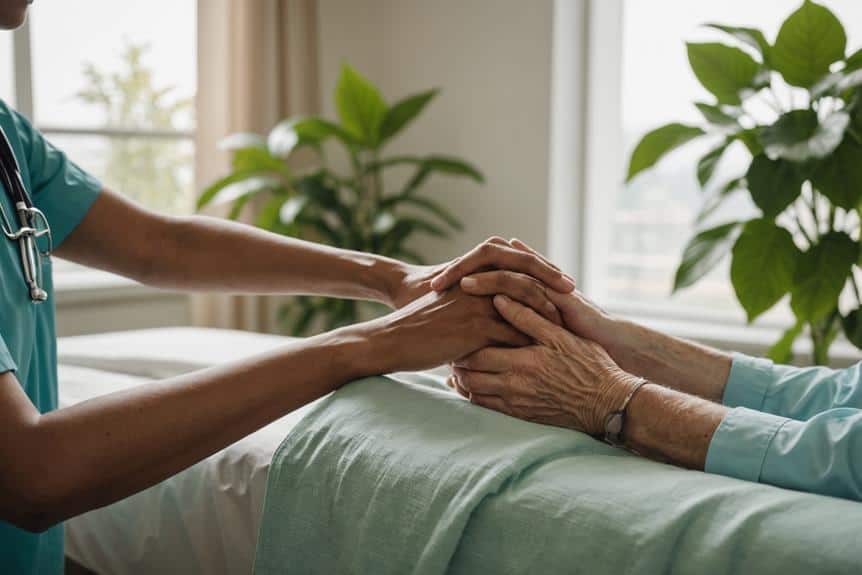Pastoral care in health and social care provides essential emotional and spiritual support tailored to your needs. This compassionate approach helps you navigate difficult times, whether you are facing health challenges or experiencing grief. Trained chaplains actively listen, helping you express your feelings while addressing spiritual concerns. They collaborate with healthcare teams to guarantee holistic care, including support for non-religious individuals. Pastoral care also involves commemorating loved ones and facilitating rituals that honor diverse traditions. This supportive environment boosts emotional well-being and fosters a sense of community. If you want to explore how this care impacts individuals further, there's much more to uncover.
Understanding Pastoral Care
One of the key aspects of pastoral care is active listening. When you share your concerns, the caregiver validates your feelings, creating a safe space for emotional expression. This practice fosters emotional well-being, helping you cope with stress and anxiety during difficult times. In the UK, where more than half of the population identifies as non-religious, the need for culturally sensitive pastoral support has never been more significant. The NHS Chaplaincy Guidelines highlight this by recognizing the rights of non-religious individuals to receive pastoral care.
Cultural sensitivity is crucial in providing effective support. By respecting diverse beliefs and backgrounds, pastoral care guarantees that everyone feels valued and heard. This inclusive approach not only enhances emotional well-being but also promotes a sense of community among patients and their families. To sum up, understanding pastoral care means recognizing its essential role in health and social care, offering compassionate support tailored to meet the needs of all individuals.
Role of Chaplains
One of the key chaplain duties involves conducting a spiritual assessment to understand the unique needs of each individual. This assessment allows chaplains to tailor their support effectively. Here are three primary responsibilities of chaplains:
- Active Listening: Chaplains create a safe environment for individuals to express their concerns and emotions. By actively listening, they build trust and foster a sense of connection.
- Facilitating Rituals: They respect diverse beliefs by facilitating meaningful rituals and ceremonies. This practice honors the spiritual traditions of patients and families, providing comfort during difficult moments.
- Collaborating with Healthcare Teams: Chaplains work closely with healthcare professionals to integrate spiritual care into overall patient support. This collaboration guarantees that the holistic needs of individuals are addressed.
Additionally, chaplains provide bereavement support, offering comfort to grieving families and conducting remembrance services to honor lost loved ones. Their presence brings solace and understanding, helping everyone involved find peace in times of loss. By fulfilling these essential duties, chaplains play a crucial role in enhancing the overall care experience within health and social care settings.
Non-Religious Pastoral Support
The NHS England Chaplaincy Guidelines 2015 recognized the rights of non-religious individuals to receive pastoral care, promoting inclusive practices within healthcare settings. Research indicates a significant gap in traditional chaplaincy, as only 4% of visits were to non-religious patients. Non-religious pastoral carers aim to fill this gap by focusing on humanistic care that addresses existential questions and personal growth.
| Aspect | Non-Religious Pastoral Support |
|---|---|
| Purpose | Provide secular support |
| Key Focus | Humanistic care and personal growth |
| Volunteer Engagement | Nearly 120 active volunteers |
| Prevalence in NHS Trusts | 40% of acute trusts |
| Inclusion in Community Models | Enhancing overall chaplaincy services |
Importance of Active Listening
Here are three key benefits of active listening in pastoral care:
- Enhances Emotional Support: By truly listening, you help patients process their experiences, which can lead to personal growth during challenging times. This approach aligns with the principles of patient-centered care, ensuring that individual needs and values are prioritized for a more meaningful healing experience.
- Builds Trust and Rapport: When patients feel heard and understood, they're more likely to trust you, enhancing the overall healing process and their satisfaction with care. This trust is foundational for effective healthcare and communication, fostering deeper connections that are essential for positive outcomes.
- Fosters a Sense of Community: Active listening creates a feeling of belonging, reassuring patients that their feelings and experiences are valued and significant.
Studies show that patients who experience emotional validation through active listening report higher satisfaction with their care and improved emotional wellbeing. This connection not only comforts those facing illness but also encourages deeper conversations, allowing for a more holistic approach to their care. By investing time in truly listening, you contribute greatly to their healing journey, reinforcing the importance of compassion in health and social care.
Bereavement and Grief Support
To honor those who have passed, special Services of Remembrance are held periodically. These gatherings create a communal space for reflection and healing, allowing families to share their memories and support each other. You can also request custom remembrance services, which are tailored to your specific wishes and beliefs. This personal touch can help you feel more connected to your loved one during such a difficult time.
Creating a comforting environment is essential for loss recovery, and community support plays a big role in this process. Engaging in grief rituals can help you navigate your feelings, providing structure to your mourning. By participating in these rituals, you honor the memory of your loved one while finding solace in shared experiences.
Whether you're facing the loss of a family member or a different type of loss, remember that you're not alone. Support is available, and it's important to reach out. Embrace the healing process, and allow yourself to grieve in your own way.





